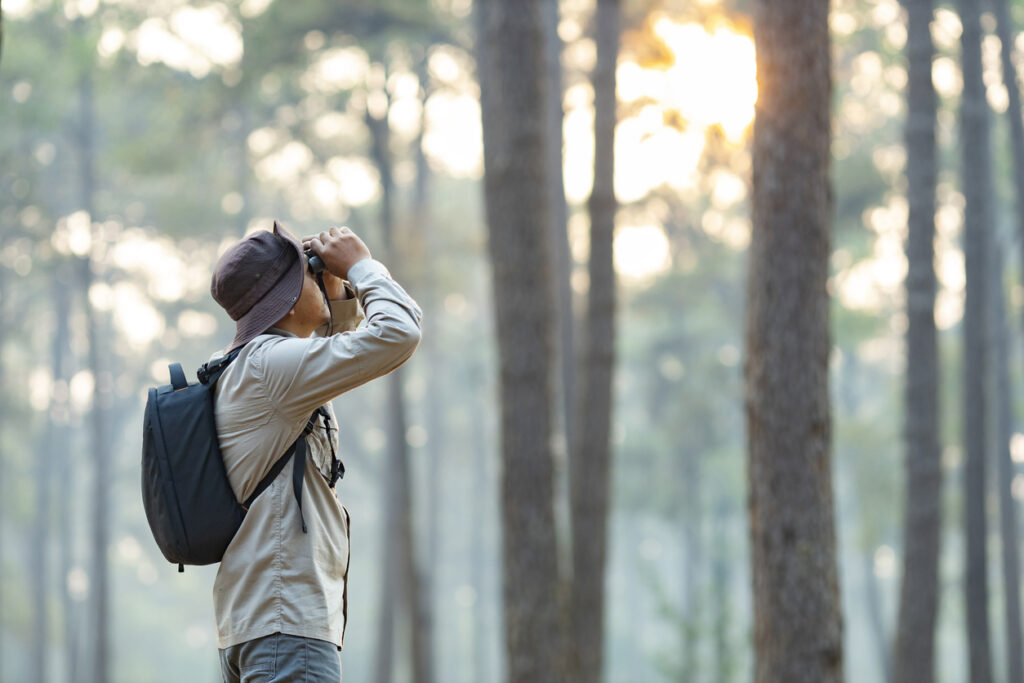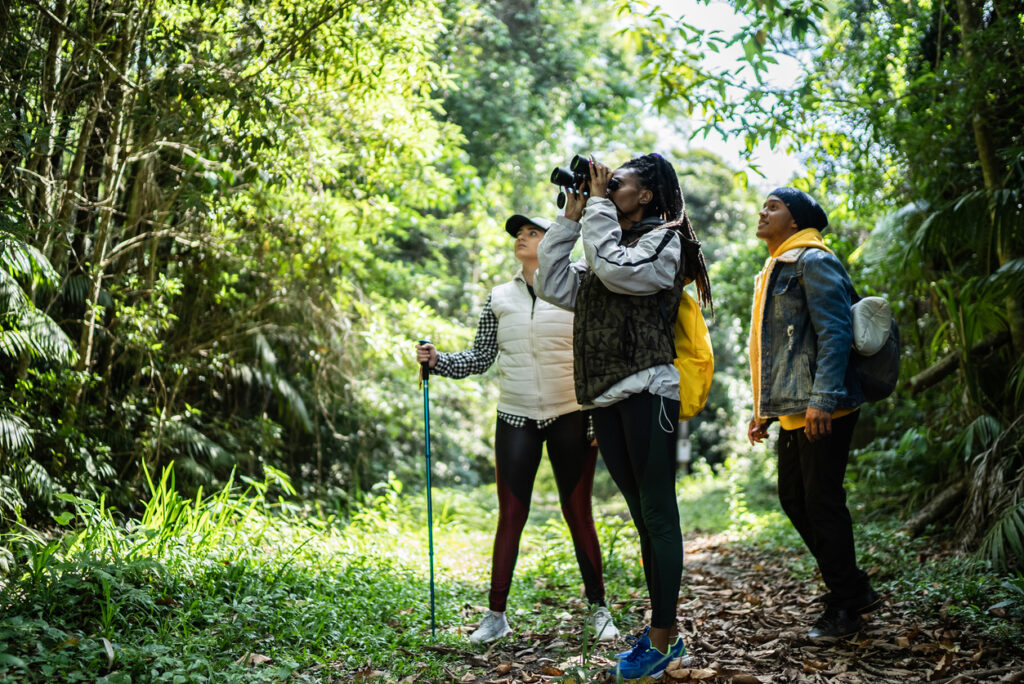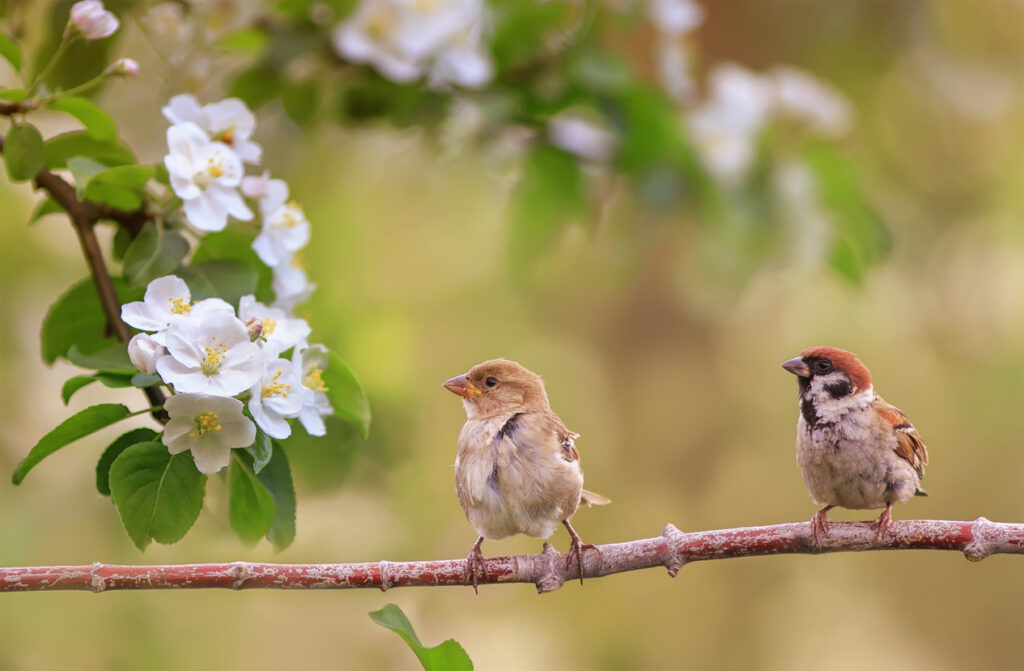
Leasing private working forests to hunters has long been a reliable source of additional cash flow for landowners and a great way to protect forested land. But as pressure to convert or develop forest land mounts, new avenues of stewardship must be explored. Birdwatching presents an exciting opportunity to connect the 40 million Americans who consider themselves birders with the Timberland investors who can provide access to unique birdwatching experiences.
Birds are Everywhere
Simply put, birdwatching is particularly well-positioned as a land-lease activity because birds are ubiquitous and present in every variant of ecosystem or habitat. Birding can be enjoyed in tall timber, wetlands, and everywhere in between, including parcels of land that often go unused as they are unsuitable for hunting.
Adam Betuel, Conservation director for Georgia Audubon, explains that the rising popularity of birdwatching is, in part, driven by the fact that birds are everywhere.
“One of the great things about bird watching or birding is that there are so many different ways to engage,” he says.
The hobby can be enjoyed casually as a relaxing way to get outside or actively, as a photographer or collector of data for the scientific community. Some birders are content to watch the same handful of species, whereas others can be highly competitive, maintaining sighting lists and traveling long distances for the chance at adding a single species.
Adam also notes the impact the COVID-19 pandemic had on the birdwatching community. As people slowed down and spent more time noticing the birds, the hobby began to pick up steam across new demographics.

A Question of Conservation
Efforts to support birdwatching as a hobby is part of Georgia Audubon’s strategy for habitat conservation.
Adam Betuel explains. “We take conservation steps to help our birds. Which, unfortunately, across the board, are in trouble. We’ve lost around 3 billion birds in the past 50 years which is around a 25-30% decrease in our bird population. So, we’re doing things to restore habitat, to give greater access to birdwatchers, to connect different communities, and to do whatever we can to make Georgia a better place for birds.”
Nick DiLuzio is also deeply involved in this vision in his role as Vice President of the Georgia Forestry Foundation. One of the organization’s core missions is to ensure the long-term sustainability of Georgia’s privately owned working forests, and he feels reconnecting youth and adults to the land is a really important piece of the puzzle.
“What we do at the Forestry Foundation,” Nick says, “is work to build bridges outside of the forestry community to make sure everybody in Georgia understands and appreciates the benefits of our 22 million acres of privately owned managed working forests.”
Forest landowners and birdwatchers are two large and passionate communities and connecting the two could lead to exceptional results.
The Georgia Bird Bookings Project
To push this bridge-building initiative into overdrive, the Georgia Forestry Foundation partnered with Georgia Audubon to create the Georgia Bird Bookings program. Developed in conjunction with Orbis, Nick DiLuzio says Georgia Bird Bookings is, “an opportunity for private forest landowners to enroll their properties in the program and sell access permits for recreational bird watching.”
As 90% of Georgia’s forest is privately owned, the program has the potential to provide an additional source of revenue for owners while opening up 90% of the state’s land for recreational use, creating value and wins for everybody.
Georgia Bird Bookings will direct private forest landowners and the birdwatching community to Orbis’ My Outdoor Agent™ website or mobile app to connect. The platform was specifically designed to encourage owners reticent to offer their land for lease by providing an incredible degree of control and flexibility. Lessors set their own price and lease terms, including access duration, time of entry, and activities permitted. My Outdoor Agent™ makes properties accessible to birders that were not available before.

A Landowner’s Perspective
Georgia Forestry Foundation trustee and avid birdwatcher Mac Peden is among the first early participants in the Georgia Bird Bookings initiative. He has leased his land to hunters for many years but is happy to expand access permits to those who share his passion for birds.
“Birds are just fun to watch,” Mac says. “They are relaxing. They are enjoyable. It makes you feel better when you see a bird hopping around. You go out to watch birds for a while and you come back and you feel better than when you started.”
Mac believes opening land up to birders is a wonderful opportunity for landowners to maintain their private property rights while also sharing the land. He mentions increased cash flow as a secondary benefit but clarifies that his primary motivation is to spread awareness to urban populations about the importance of the Georgia forest and to help people better understand how sustainable forestry is good for wildlife and birds along with clean water and air for everyone.
Technology-Driven Birding
The My Outdoor Agent™ app is just one technology-based tool making birdwatching more accessible to new demographics. Social media encourages younger generations to post birdwatching photography online and identification apps like Merlin simplify an activity that can be intimidating to get into, as each state is home to hundreds of different species. Users can listen to bird songs with their mobile phone, which in turn matches the song to the bird.
The Cornell Lab of Ornithology’s eBird platform combines sighting data from hundreds of thousands of users to showcase hot spots where and when species have been spotted. The platform offers landowners an additional marketing opportunity by having lessees upload data on the birds present on their property to inform future users.
Timberland Investors on Board
Tiffanie Starr, the Managing Director of Acquisitions for Timberland Investment Resources (TIR) manages 900,000+ acres of land for clients across the country, reaching from New York to Oregon. She says her clients are constantly on the lookout for ways to better showcase the stewardship they provide.
Partnerships with the general public help more people see the wildlife habitat and environmental benefits of working forests.
“We’re always looking for new technology and market-based opportunities for our clients that add additional revenues to their asset base,” Tiffanie explained, “and so having something this innovative, that really brings the community together with the landowners. It’s just the perfect combination that we’re looking for.”
Tiffanie reiterates the point that birding presents a new, outside-the-box idea for the timberland investment community to expand offerings beyond traditional hunting leases. “We have so many different habitat types on our properties that would welcome other people to enjoy.”
Conclusion
Every year, in Georgia alone, 120,000 acres of forest land are lost to development or agricultural conversion. While agricultural land can be reforested, developed land cannot. Leasing private working forest land to birdwatchers presents a real opportunity to help landowners of all sizes, from small holdings to institutional investors, to maximize the value of maintaining their property as forest land. Efforts to connect the timberland investment community with birdwatchers is a win-win.
Watch the full Connecting Birdwatchers to the Timberland Investment Community Campfire Session:

Let’s Work Together
Orbis helps you make better sense of your assets, and better use of everything involved in managing them. Request more information or book a consultation with us today.
